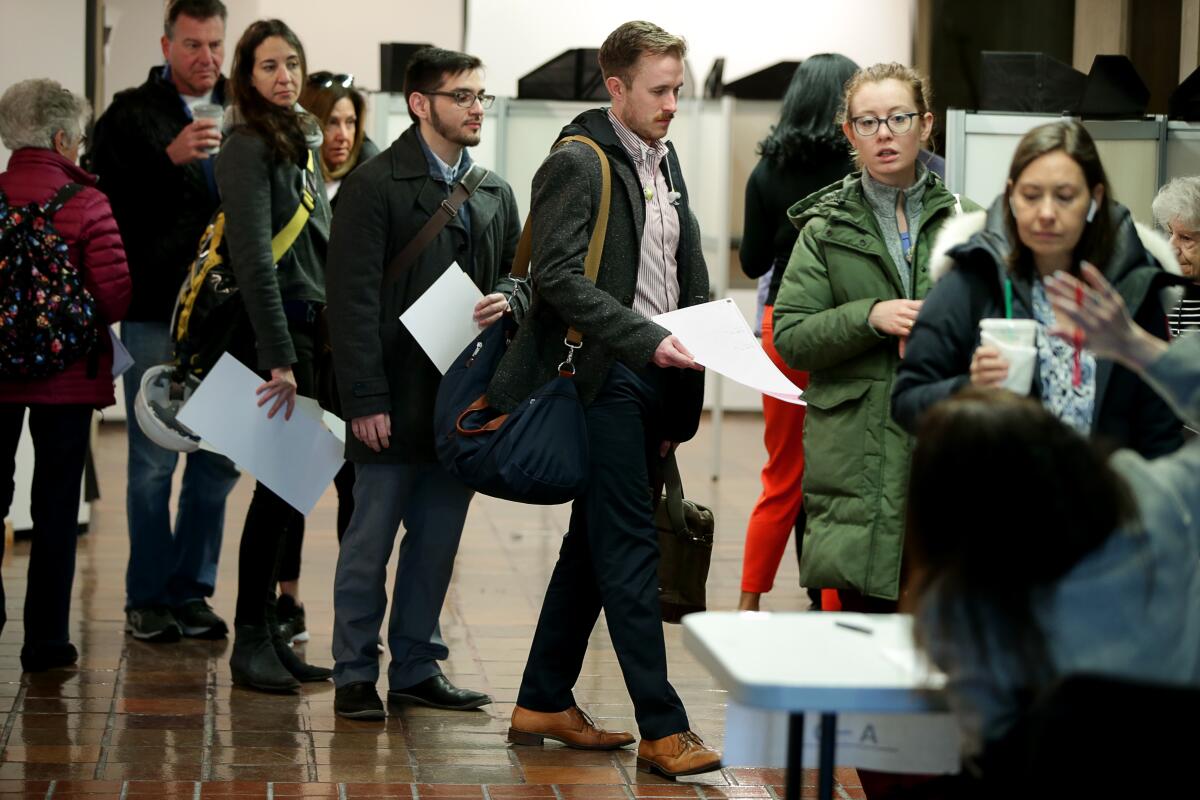How to know who’s winning on Super Tuesday: Five things to watch

- Share via
Super Tuesday is upon us — primaries from Maine to California, 14 states in all, distributing more than a third of all the delegates to this summer’s Democratic nominating convention. In some states, notably California, voters have been casting ballots for weeks already.
Here are five key things to watch for as the returns come in:
How much does Joe Biden dominate the South?
In 2016, Vermont Sen. Bernie Sanders’ inability to beat Hillary Clinton in Southern states ultimately led to his defeat. Sanders and his aides learned from that experience and put significant effort into wooing African American voters, who make up a large share of the Democratic electorate in the South.
But in Saturday’s South Carolina primary, Joe Biden upended those hopes. The former vice president won handily because he took more than 6 in 10 African American voters, according to the exit poll conducted by Edison Research for the major television networks.
African Americans made up well over half the electorate in South Carolina. They’ll probably come close to that in Alabama, which votes Tuesday, and also make up a significant share of the vote in other Southern states. If they show up for Biden the way they did on Saturday, he will have a strong shot at winning North Carolina, Virginia and Arkansas, as well as Alabama. Together, those states account for nearly 300 of the 1,357 delegates at stake in Tuesday’s voting.
If Biden wins big and takes a large share of those delegates, that could offset Sanders’ expected haul from California, where he appears likely to take at least half of the state’s 415 delegates up for grabs on Tuesday.
Polls close in Virginia at 4 p.m. PST and in North Carolina at 4:30. If Biden’s having a good night, that should be apparent early from the returns in those two states. Conversely, if Sanders has a shot at cracking Biden’s wall of support in the South, those states will show it.
Can Elizabeth Warren hold her home state?
Unlike former South Bend, Ind., Mayor Pete Buttigieg and Sen. Amy Klobuchar of Minnesota, who both have dropped out of the race and endorsed Biden, Elizabeth Warren has stayed in the race — at least so far. The senator from Massachusetts is popular among liberal voters in her home state, but so is Sanders. Recent polls have shown the two in a tight race.
Warren staying in the race could deprive Sanders of a significant number of delegates. Unless the outcome unexpectedly turns into a blowout in one direction or the other, the two probably will split the state’s 91 delegates. If Warren were to drop out, Sanders most probably would win a larger share.
The Warren campaign has made clear that it no longer harbors expectations that she can win a majority of delegates. Instead, their hope is to amass enough delegates to give the senator a strong voice in convention negotiations over the nominee and the party platform. Warren has strong appeal to college-educated, liberal, white voters, especially women. That’s a significant constituency among Democrats and one with whom both Biden and Sanders have done relatively poorly.
A delegate strategy only works, however, so long as the campaign has enough money to keep going. Losing her home state could be a significant blow to Warren’s fundraising, so she has more than just the delegate count riding on the outcome.
Here are 2020 Democratic presidential candidates Joe Biden and Bernie Sanders’ plans on healthcare, immigration, climate, gun control and housing and homelessness.
Bloomberg spent more than $660 million, and what did he get?
Former New York Mayor Michael R. Bloomberg has spent more money in a shorter period of time in the primaries than any presidential hopeful ever. What will he have to show for it?
Bloomberg had hoped that his massive fortune would make him the alternative to Sanders. Instead, the money made him a target. A Democratic electorate inclined to distrust oligarchic wealth has resisted him, and since South Carolina, the party establishment has rapidly consolidated behind Biden.
The key question for Bloomberg no longer seems to be if he can win states — although that’s still possible in some places where he’s been advertising for weeks and others haven’t, such as Tennessee. Instead, the more realistic prospect is that he can win delegates if he surpasses the 15% threshold in some states.
Where Bloomberg goes over the threshold could matter too. The more candidates who cross the threshold in a state, the fewer delegates end up going to the winner there. So Sanders will want Bloomberg to get delegates in states that Biden wins, and vice versa.
Texas could determine the overall winner
With Biden likely to do well in states such as Virginia and North Carolina, and Sanders poised to take the lion’s share in California, Texas and its 228 delegates probably will be the fulcrum on which the night turns. Not for nothing did Biden hold his final big Monday night rally in Dallas, where he got endorsements from Buttigieg, Klobuchar and former Texas Rep. Beto O’Rourke.
Polls in Texas have been mixed. Some have shown Sanders with a significant lead, others have shown a close Sanders-Biden lead. Almost all the polling pre-dates the South Carolina voting, however, so it’s of limited usefulness.
Sanders probably will do well among the state’s large Latino population. How big a Latino turnout he can generate will be one major question. Another will be how well Biden does in the Houston and Dallas suburbs — formerly Republican areas where Democrats made major gains during the 2018 midterm election.
Early vote versus late count in California
California voters have been able to cast ballots since early February. Most haven’t.
Through Sunday, just over 20% of the mail-in ballots that voters had requested had been returned, according to Political Data Inc., which has been tracking the ballots. Most voters appear to have waited until late in the process to cast their votes — a wise precaution in such a volatile race.
As we’ve seen repeatedly, state officials will take weeks to count all of California’s late-arriving mail-in ballots. They aren’t required to have a final count until April 2.
That final count probably will differ significantly from the results on election night, and the difference could matter a lot in determining how many delegates each candidate gets. Remember, delegates only go to candidates who get 15% of the vote either statewide or in congressional districts. The long, slow count could provide an agonizing wait for candidates just above or just below that mark on election night.
Whose totals probably will go up or down?
Buttigieg, who was getting about 10% of the vote in statewide polls last week, probably will have a significant showing in the early voting and the results that get released on election night. Predictably, his vote will drop off as late ballots get added to the total. So will Klobuchar’s.
Bloomberg’s share may decline, as well. In our poll last week with the Institute of Governmental Studies at UC Berkeley, the former mayor’s vote was trending down during the week the survey was in the field. That trend could well have accelerated in recent days.
By contrast, Biden’s vote probably will go up from whatever share he gets on election night. That may also be true for Sanders, as well: In 2016, his supporters were more likely to vote late.
California’s primary election is March 3, 2020. Here’s what you need to know about the presidential candidates and voting on Super Tuesday.
More to Read
Get the L.A. Times Politics newsletter
Deeply reported insights into legislation, politics and policy from Sacramento, Washington and beyond. In your inbox three times per week.
You may occasionally receive promotional content from the Los Angeles Times.













